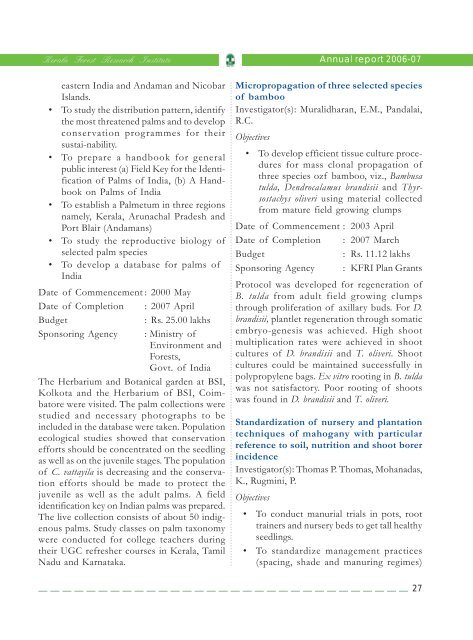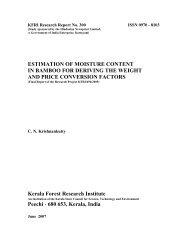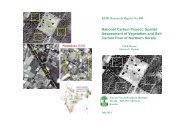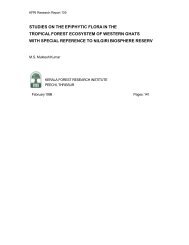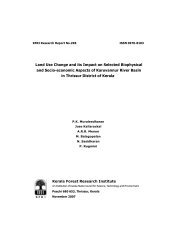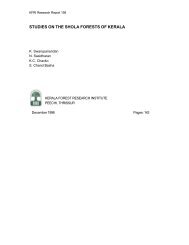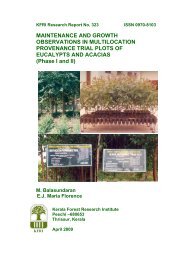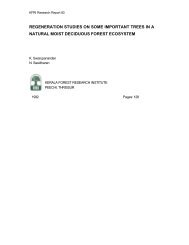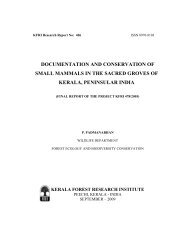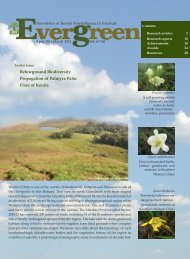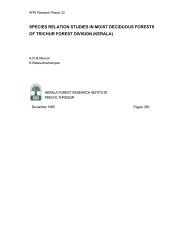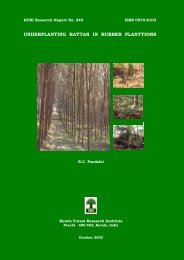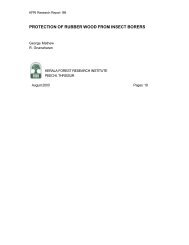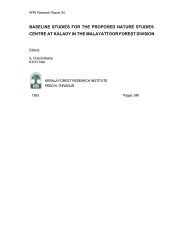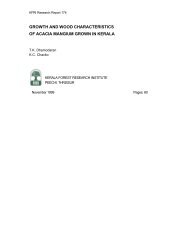2006-07 - Kerala Forest Research Institute
2006-07 - Kerala Forest Research Institute
2006-07 - Kerala Forest Research Institute
- No tags were found...
Create successful ePaper yourself
Turn your PDF publications into a flip-book with our unique Google optimized e-Paper software.
<strong>Kerala</strong> <strong>Forest</strong> <strong>Research</strong> <strong>Institute</strong>Annual report <strong>2006</strong>-<strong>07</strong>eastern India and Andaman and NicobarIslands.• To study the distribution pattern, identifythe most threatened palms and to developconservation programmes for theirsustai-nability.• To prepare a handbook for generalpublic interest (a) Field Key for the Identificationof Palms of India, (b) A Handbookon Palms of India• To establish a Palmetum in three regionsnamely, <strong>Kerala</strong>, Arunachal Pradesh andPort Blair (Andamans)• To study the reproductive biology ofselected palm species• To develop a database for palms ofIndia...................................................................................................................................................................................Date of Commencement : 2000 MayDate of Completion : 20<strong>07</strong> AprilBudget: Rs. 25.00 lakhsSponsoring Agency : Ministry ofEnvironment and<strong>Forest</strong>s,Govt. of IndiaThe Herbarium and Botanical garden at BSI,Kolkota and the Herbarium of BSI, Coimbatorewere visited. The palm collections werestudied and necessary photographs to beincluded in the database were taken. Populationecological studies showed that conservationefforts should be concentrated on the seedlingas well as on the juvenile stages. The populationof C. vattayila is decreasing and the conservationefforts should be made to protect thejuvenile as well as the adult palms. A fieldidentification key on Indian palms was prepared.The live collection consists of about 50 indigenouspalms. Study classes on palm taxonomywere conducted for college teachers duringtheir UGC refresher courses in <strong>Kerala</strong>, TamilNadu and Karnataka.Micropropagation of three selected speciesof bambooInvestigator(s): Muralidharan, E.M., Pandalai,R.C.Objectives• To develop efficient tissue culture proceduresfor mass clonal propagation ofthree species ozf bamboo, viz., Bambusatulda, Dendrocalamus brandisii and Thyrsostachysoliveri using material collectedfrom mature field growing clumpsDate of Commencement : 2003 AprilDate of Completion : 20<strong>07</strong> MarchBudget: Rs. 11.12 lakhsSponsoring Agency : KFRI Plan GrantsProtocol was developed for regeneration ofB. tulda from adult field growing clumpsthrough proliferation of axillary buds. For D.brandisii, plantlet regeneration through somaticembryo-genesis was achieved. High shootmultiplication rates were achieved in shootcultures of D. brandisii and T. oliveri. Shootcultures could be maintained successfully inpolypropylene bags. Ex vitro rooting in B. tuldawas not satisfactory. Poor rooting of shootswas found in D. brandisii and T. oliveri.Standardization of nursery and plantationtechniques of mahogany with particularreference to soil, nutrition and shoot borerincidenceInvestigator(s): Thomas P. Thomas, Mohanadas,K., Rugmini, P.Objectives• To conduct manurial trials in pots, roottrainers and nursery beds to get tall healthyseedlings.• To standardize management practices(spacing, shade and manuring regimes)27


